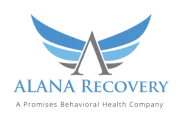If you or someone you love struggles with cocaine, you’re not alone. Cocaine abuse can spiral quickly, leading to serious physical, emotional, and social consequences. At ALANA Recovery, we support those seeking a life free from substance abuse through compassionate rehabilitation services, including cocaine addiction treatment options. Whether you’re looking for answers for yourself or someone else, we’re here to provide information and help.
What To Know About Cocaine Abuse
Cocaine is a powerful stimulant derived from the coca plant leaves. It’s commonly abused because of its euphoric effects, but its high is short-lived, often leaving users chasing the next dose. Over time, this cycle can lead to addiction.
According to the 2023 National Survey on Drug Use and Health (NSDUH), five million people aged 12 or older in the United States have used cocaine in the past year, with rates climbing steadily in some demographics.1 Cocaine use not only impacts the person using it but also creates ripple effects, affecting families, workplaces, and communities.
Using cocaine can make you feel a rush of intense euphoria, a surge of energy, and sharp alertness, often leaving you without much appetite. But even trying it once can come with serious risks, like a heart attack or stroke.
What Are the Signs of Cocaine Abuse?
Recognizing the warning signs of cocaine abuse early can help prevent further harm. While these signs vary from person to person, here are several common indicators to watch for:
- Physical signs – Dilated pupils may occur. If the substance is snorted, frequent nosebleeds or nasal congestion can occur. Rapid weight loss is also a possible effect.
- Changes in behavior – You might notice someone becoming more secretive or spending more time alone. You could also start having money troubles due to overspending or even engage in risky behaviors like driving after drinking.
- Health impacts – You may struggle with insomnia or have trouble getting a good night’s sleep. You might also see them feeling restless or on edge more often.
If you or someone close to you is showing signs of concern, it could point to a deeper issue with cocaine use, and seeking help might be the best next step.
Cocaine use carries significant risks, including long-term mental health challenges like anxiety and paranoia, severe damage to nasal tissue from snorting, financial or legal troubles, and the potential for dependence and addiction. Recognizing these risks is vital in identifying when cocaine use shifts from occasional to problematic.
Is Cocaine Addictive?
The short answer is yes, cocaine is highly addictive. Its ability to produce temporary euphoria makes it very appealing, but this effect comes at a steep cost. Cocaine impacts dopamine levels in your brain, the chemical responsible for pleasure and reward. Over time, frequent use rewires your brain, making it harder to feel good without the drug. This is what leads to dependency and addiction.
Can Cocaine Addiction Co-Occur With Other Mental Health Conditions?
Yes, it’s common for cocaine use to overlap with mental health issues, a condition known as dual diagnosis. Many people who use cocaine do so to cope with underlying mental health challenges like depression, anxiety, or trauma. However, the use of cocaine often exacerbates these conditions.
Common mental health conditions linked with cocaine addiction include:
- Anxiety disorders
- Depression
- Post-traumatic stress disorder (PTSD)
Recovering from addiction means more than just breaking the habit—it’s about addressing the mental health struggles that often come with it. ALANA Recovery focuses on treating the whole person, not just the addiction, so you can build a strong foundation for long-term healing.
How Cocaine Addiction Treatment Can Help
Getting the proper support can be life-changing. With the right help, overcoming cocaine addiction is possible, and we’re here to walk that journey with you. At ALANA Recovery, we’re here to guide you or a loved one from addiction to sustained recovery. Our Georgia outpatient programs offer flexible yet structured pathways for rebuilding every aspect of your life. Here’s what you can expect from our cocaine addiction treatment program:
- Personalized care – Therapy sessions and mental health support for individuals with dual diagnoses
- Tools to cope – Practical relapse prevention strategies and life skills training to restore relationships, careers, and stability
- Community support – Connection with sober peers who share similar challenges
Cocaine addiction is treatable, and you never have to face it alone. With evidence-based practices and a compassionate team by your side, starting this recovery process is an investment in your future self.
Find Help Today at ALANA Recovery
Recovery from cocaine isn’t just possible—it’s within reach. If you or someone you love is struggling with cocaine addiction, your first step is simply reaching out. At ALANA Recovery, we understand the challenges of addiction and offer the support and care needed to overcome them. Contact our team online or call 770.759.7474 to start your recovery today.
Footnote:

